After several years of lawsuits and settlements, the Roundup lawsuit has slowed down as Roundup manufacturer Bayer gained ground, including a favorable Philadelphia court ruling in September 2024. With the legal landscape shifting since the initial cases in 2016, a common question remains: “What is the average payout for Roundup lawsuit cases?”.
At Sparrow, we provide class action discovery and claim filing services. Our platform offers key information and tools for class members to join lawsuits without delay. We’ve helped clients file claims for numerous class actions, from retail cases like the Macy’s class action lawsuit to health-related ones like the Ozempic class action lawsuit.
With our long-standing industry experience, we’ll answer the question, “What is the average payout for Roundup lawsuit settlements?”. We’ll discuss the legal backdrop that this case is set against. We’ll also cover the factors affecting payouts and what you need to qualify.
Let’s get started.
Roundup and Its Controversies
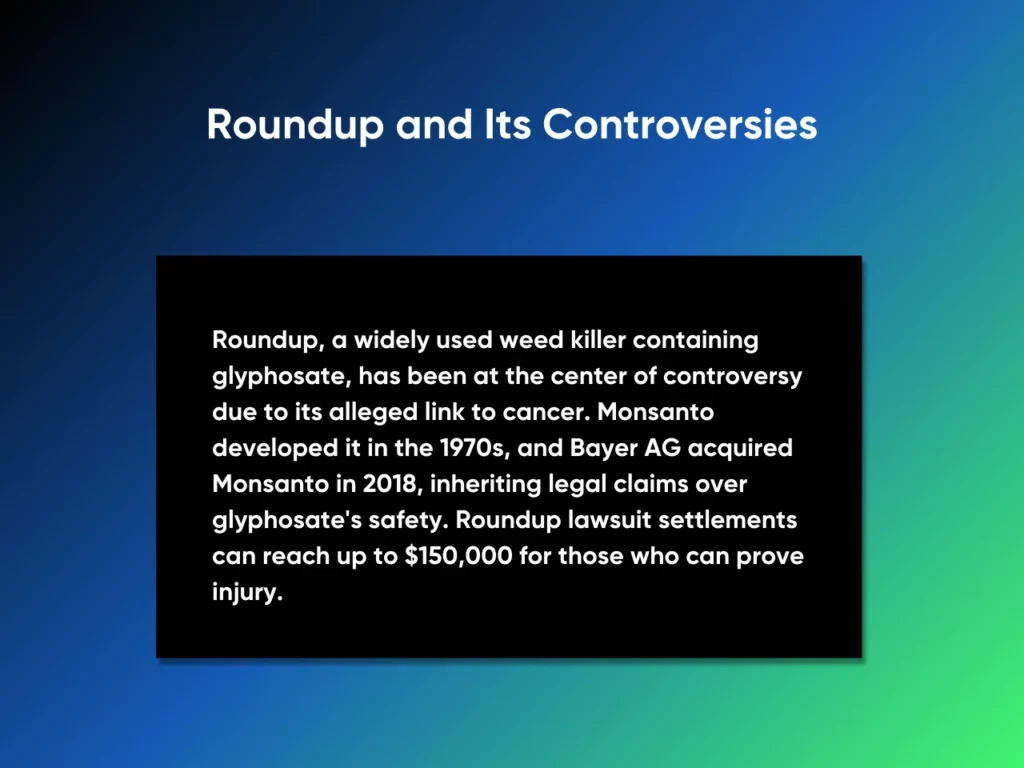
If you’re wondering, “What is the average payout for Roundup lawsuit?”, the answer ultimately depends on how much it affected you. Courts have different opinions on Roundup’s liability, but legal experts suggest that the average Roundup settlement amount can go up to $150,000 for those who can prove injury.
Roundup weed killer, a glyphosate-based herbicide developed by Monsanto in the 1970s, is the most widely used weed killer globally. In 2018, Bayer AG, a pharmaceutical and life sciences company based in Germany, acquired Monsanto to strengthen its agricultural division. However, this acquisition also brought with it legal claims over glyphosate’s potential cancer risks.
The History of Roundup Usage
Introduced by agrochemical company Monsanto in 1974, the weedkiller Roundup quickly gained popularity as an herbicide for its effectiveness in controlling weeds in agricultural, residential, and commercial spaces. Its active ingredient, glyphosate, has become a staple for agricultural workers, landscapers, and homeowners looking to protect their crops and gardens from invasive species.
Over time, Roundup became the most popular weed killer on the market, but its success was marred by growing concerns about its impact on users’ health. The dangers of Roundup would come to light after the World Health Organization published research in 2015.
Health Concerns Linked to Glyphosate
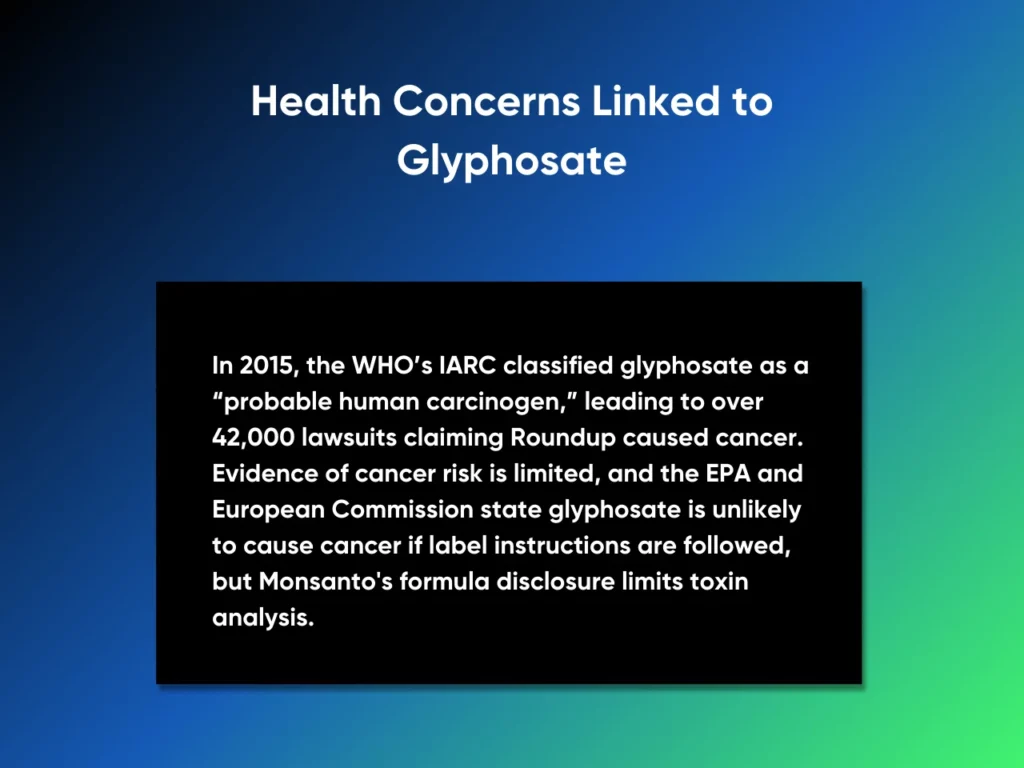
In 2015, the World Health Organization’s International Agency for Research on Cancer (IARC) listed glyphosate as a “probable human carcinogen” in a report. This link led to numerous class action lawsuits, with over 42,000 plaintiffs alleging that glyphosate-based Roundup herbicides caused their cancer.
Evidence linking human cancer risk to significant glyphosate exposure, such as in landscaping or agricultural work, is limited. Studies have also found no direct link between the substance and increased health issues or cancer risk in home use. However, there have been claims that Monsanto has influenced scientific papers on the subject through ghostwriting.
Scientific organizations such as the US Environmental Protection Agency (EPA) and the European Commission agree that glyphosate, when used according to the label instructions, is unlikely to cause cancer. However, since Monsanto does not disclose the full formula for their Roundup products, researchers argue that it is impossible to do a comprehensive toxin analysis for every ingredient.
Regulatory Responses and Public Reactions
Currently, twenty-five US states are restricting the use of Roundup weedkiller and other glyphosate-based products to some degree. Portland, Oregon, has been one of the most stringent, having restricted the use of Roundup for the last thirty years. Similarly, Montgomery County, Maryland, has banned its use for cosmetic purposes.
In Europe, countries such as France, Belgium, and the Netherlands have slowly enacted bans on glyphosate since it was identified as a potential carcinogen in 2015. Germany, home to Bayer, was among the countries that pushed the latest restrictions on Roundup. However, places where agriculture is the chief contributor to the economy, such as the US state of Montana, are slower to follow suit.
The Legal Battles Against Roundup
Several landmark cases against Bayer have shaped the legal landscape regarding Roundup. These cases have established the approach courts take to the Roundup litigation today.
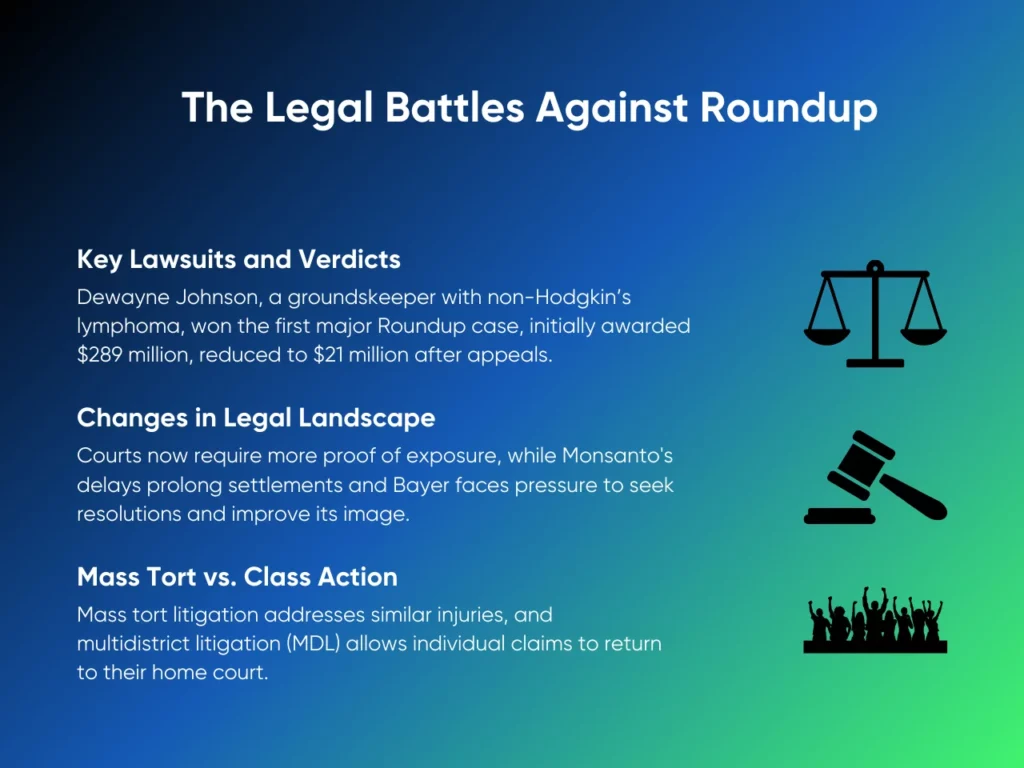
Key Lawsuits and Verdicts Up to 2024
In 2018, Dewayne Johnson, a school groundskeeper who developed non-Hodgkin’s lymphoma, achieved a significant legal victory for Roundup plaintiffs. Following revelations about Roundup’s potential carcinogenic properties, Johnson pursued litigation and initially won $289 million in punitive damages from the jury. However, this amount was later reduced to $21 million after Monsanto filed multiple appeals against the Roundup verdict.
As of 2024, Bayer has agreed to settle over 100,000 lawsuits related to irs failure to disclose or address the potential carcinogenic effects of Roundup. The total amount paid out so far is $11 billion, with individual settlements ranging from $5,000 to $250,000, based on the severity of each case.
How the Legal Landscape Has Changed Over Time
Although Roundup victims have won initial victories, Monsanto has slowly gained ground in recent years as the litigation has progressed. After several motions and appeals, courts are now requiring more extensive documentation of exposure and illness to establish the link between Roundup and cancer. This shift in burden of proof reflects the low probability of developing cancer from Roundup exposure. Monsanto’s delaying tactics–a key contributor to why settlements take so long–have effectively tipped the balance in their favor.
However, public sentiment continues to pressure Bayer to seek smooth settlement agreements and repair the image of Roundup products. Bayer’s five-point plan for this litigation includes resolving all outstanding suits by paying settlements. They also share plans to reformulate Roundup to remove its carcinogenic properties.
Role of Mass Tort Litigation and Class Action Suits
The Roundup litigation is characterized as mass tort litigation rather than a class action suit. This distinction led United States courts to consolidate all claims into a multidistrict litigation (MDL). Mass torts involve large groups of plaintiffs who suffered similar injuries from the same product or event.
The consolidation into an MDL aims to ensure a fairer handling of each claim compared to a class action. A Roundup class action lawsuit would have treated all claims uniformly and may result in lower payouts for class members. MDLs also allow individual claims to return to their home courts automatically, avoiding the need for separate filings if a class action is dismissed.
Factors Influencing the Average Payouts
Monsanto is facing around 100,000 lawsuits, and with more cases and potential future Roundup claims on the horizon, Bayer is intensifying its efforts to sway the Supreme Court in their favor or at least mitigate the amount awarded in each settlement.
Regardless of the potential settlement you may qualify for, several factors influence the amount you receive in a Roundup case payout. These are quantified in a points system that categorizes claimants into specific settlement tiers that determine how much they get in the settlement.
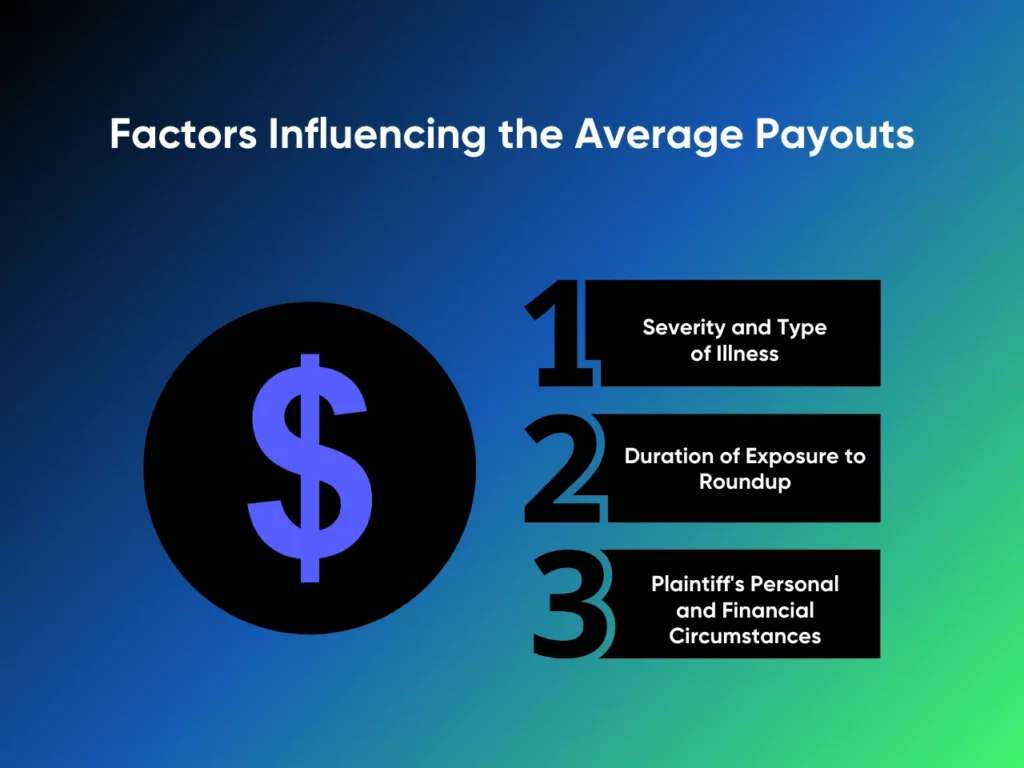
Severity and Type of Illness
The severity of the illness linked to Roundup products is the chief factor determining the compensation amount. The scoring system for this category accounts for whether the cancer type is linked to glyphosate, the cancer stage, and the victim’s age at the time of diagnosis. Individuals with terminal illnesses often get the largest compensatory damages, upwards of $250,000.
Duration of Exposure to Roundup
The length and frequency of exposure to Roundup also significantly influence the plaintiff’s settlement amount. For instance, Dewayne Johnson worked as a school groundskeeper for decades and sprayed hundreds of gallons of Roundup and Ranger Pro, a similar Monsanto product, throughout his career. This prolonged exposure played a significant role in the substantial settlement he was initially awarded before the appeals took effect.
Plaintiff’s Personal and Financial Circumstances
Personal factors, such as the plaintiff’s age, number of dependents, and specific financial situation, can also affect the final settlement. Younger plaintiffs with dependent children may receive higher compensation to account for future lost earnings and care costs. Medical expenses are also an important factor.
How to Qualify for a Roundup Lawsuit
If you believe you’re entitled to a Roundup settlement, gather evidence to support your claim. While some settlements accept occasional exposure, others require proof of illness caused by glyphosate. For instance, the ongoing multidistrict litigation in the Northern District of California has stricter criteria for filing claims due to Bayer’s resistance.
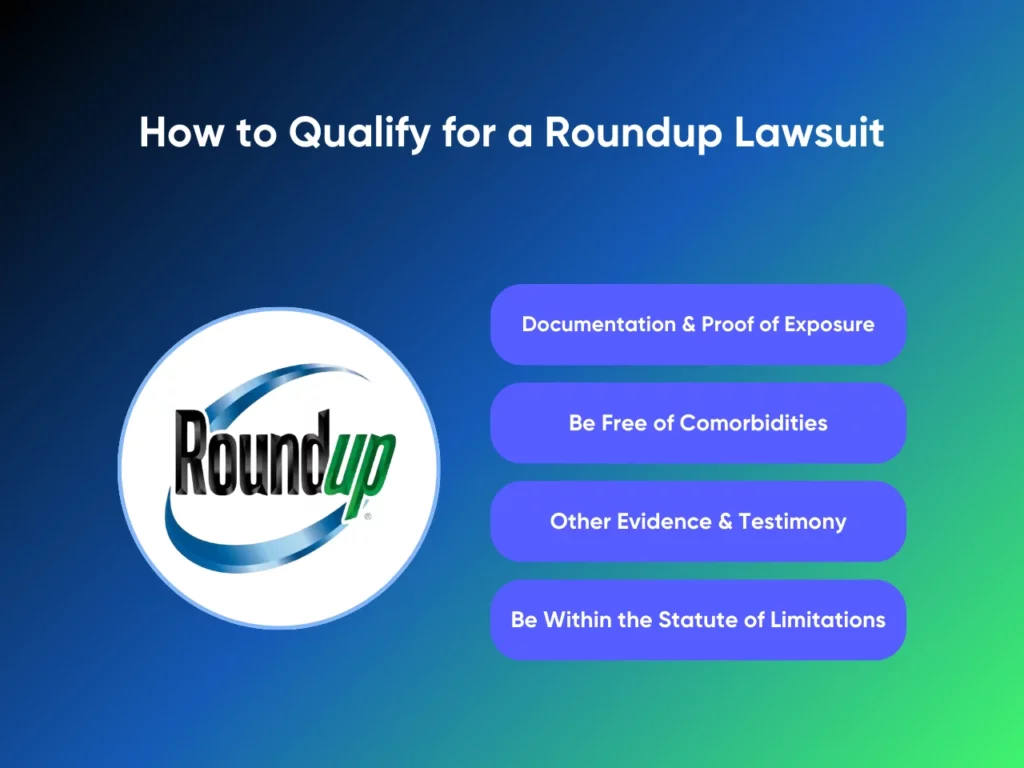
Documentation and Proof of Exposure
To qualify for a portion of the Roundup lawsuit settlement, plaintiffs must provide solid documentation proving their exposure to the product. This can include purchase receipts, medical records linking their illness to glyphosate exposure, employment history, and other evidence of using glyphosate products.
More comprehensive evidence can lead to higher potential payouts and increase the chances of qualifying under stricter settlement terms.
Be Free of Comorbidities
Make sure you don’t have preexisting comorbidities, such as a history of cancer and having HIV/AIDS, and avoid activities like smoking and taking immunosuppressants, as these could invalidate your claim.
These factors might be used to argue that they caused your illness instead of Roundup, making it difficult to definitively prove the link between Roundup and your illness.
Other Evidence and Testimony
Other pieces of evidence and testimony that could reinforce your claim include statements from friends and family who can corroborate your exposure to glyphosate on the occasions that you named. Certain settlements may ask that you present scientific studies that prove a positive link between glyphosate exposure and your condition.
If you’re filing a claim on behalf of a deceased loved one, you should be able to present a death certificate and autopsy documentation to verify that the death was caused by glyphosate-induced cancer.
Be Within the Statute of Limitations
To qualify for a settlement claim, you must be within the statute of limitations for product liability in the state where the lawsuit was filed. In California, for example, you must file a claim within two years of the cancer diagnosis. The deadline may vary in other states.
When Will Roundup Settlements Be Paid?
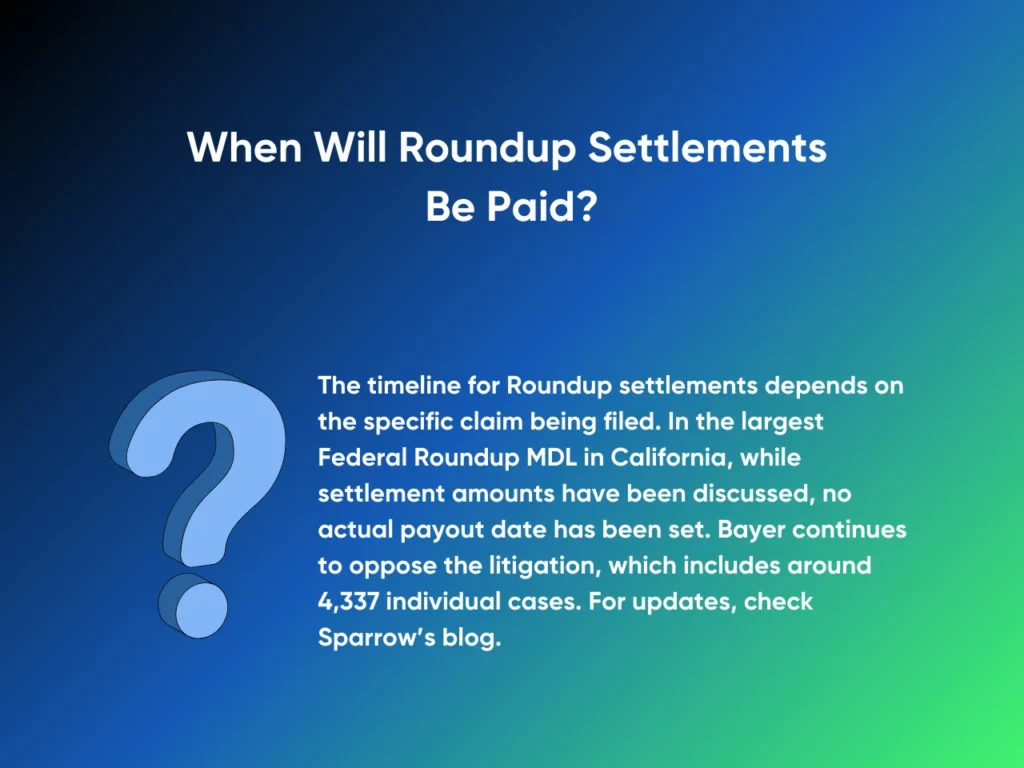
Some individuals who have already submitted their settlement claim might ask, “When will I get my Roundup settlement check?” The exact timeline of Roundup lawsuit payouts will ultimately depend on the specific settlement you’re claiming. For the largest Federal Roundup MDL filed in California, although Roundup lawsuit settlement amounts have already been discussed, there is still no actual date for when the settlement will be paid out.
Bayer is still working to minimize their financial damage and thus continues to oppose the Roundup multidistrict litigation, which currently comprises around 4,337 individual cases. Check back on Sparrow’s blog for future Roundup updates.
Key Takeaway
So, what is the average payout for Roundup lawsuit in 2024? While the average is $150,000, remember that this is skewed by extreme cases, like Dewayne Johnson’s and those with terminal illnesses. Those who have had provable negative health outcomes or could not adequately prove that glyphosate caused an illness may still be eligible for a smaller amount, typically around $5,000, depending on the frequency of exposure.
If you’re eligible for a settlement in a Roundup cancer lawsuit, take into account the severity of your illness and duration of exposure, which are the chief factors that will determine the settlement amount. Medical bills, lost income, and dependents also influence the settlement amount.
Would you like to receive important updates about the latest class actions you may qualify for directly to your email? Reach out to Sparrow today to get notified of class actions that you can join as soon as they appear and get expert assistance in joining and filing claims.


